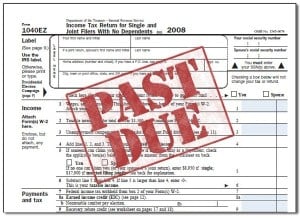What Happens If You Don’t File Your Taxes?

The only certainties in life are death and taxes, as the saying goes. Taxes are an annual event that, however unpleasant, we all have to deal with. It may interest you to know that according to the Internal Revenue Service (IRS), an estimated 239.3 million tax returns were filed in 2012 by individuals and businesses in the United States. That amount exceeded by a little more than 1% the number of returns that were filed in 2011, and by 2018 that number is projected to grow by almost 6% to 253.5 million tax filings.
What about those individuals who do not file a regular tax return? More importantly, what would be your fate if you did not pay your taxes in a timely manner? Below are some of the potential consequences that you may face for failing to file or pay your taxes in a timely manner.
Failure to File Penalty
Whether you owe taxes or expect a refund for a given tax year, it is important to provide the IRS with an informational tax return on or before April 15th of every year. When you miss the April 15th deadline you are subject to a penalty of 5% of the amount that you owe for each month you do not file. The penalty for failure to file can grow to 25% of the total unpaid amount. If you file a return 60 days after the due date of April 15th, you will be subject to a penalty of $135 or 100% of the unpaid tax liability, whichever is greater. This applies to both those expecting a refund and those who have taxes due.
Failure to Pay Penalty
In addition to the failure to file penalty that you face for missing the filing deadline, you are subject to a failure to pay penalty of half of 1% of the unpaid balance. This amount is assessed each month that your taxes go unpaid and is capped at 25% of the unpaid amount. Generally the failure to file penalty is higher than the failure to pay penalty. Filing a tax extension (Form 4868) on or before April 15th and paying some or up to 90% of the amount owed, as well as paying the balance in full by the extension deadline (typically 6 months or by October 15th), will help you avoid the failure to file and failure to pay penalties.
Loss of a Tax Refund
If you are owed a refund from the Federal government, filing a tax return by the deadline is the only way for you to ensure that the money will be returned to you in a timely manner. The IRS can hold a taxpayer’s refund for up to 3 years. After this time your refund is treated as a “gift” to the government and will remain in the treasury. This means that your failure to file could result in a generous donation of your tax refund to the federal government to do with as they please. Don’t let that happen…
Loss of Wages, Assets or Arrest
If you do not pay your taxes, the IRS will eventually come after you directly. There initial contact will be a letter informing you of your outstanding liability (or failure to file) with an opportunity to file an amended return. Ignoring this opportunity will result in a possible wage garnishment and even seizure of your assets, such as your home or car. If the amount of your tax liability is deemed by the IRS to be excessive you may be arrested and charged with tax evasion, subject to a fine of up to $100,000 and up to 5 years in prison.
Suspension Of Drivers License
Some states like New York are suspending the drivers licenses and/0r disallowing the renewal of licenses for those that have not paid their taxes. This recently went into effect in 2013. Expect more and more states (especially those with budget issues) to follow suit.
Not filing your taxes, or failing to pay them, is a serious concern and should not be taken lightly. If you need help filing your taxes, or you’ve missed a deadline and need to know what your next steps should be, don’t hesitate to contact an R&G Brenner professional tax preparer.





